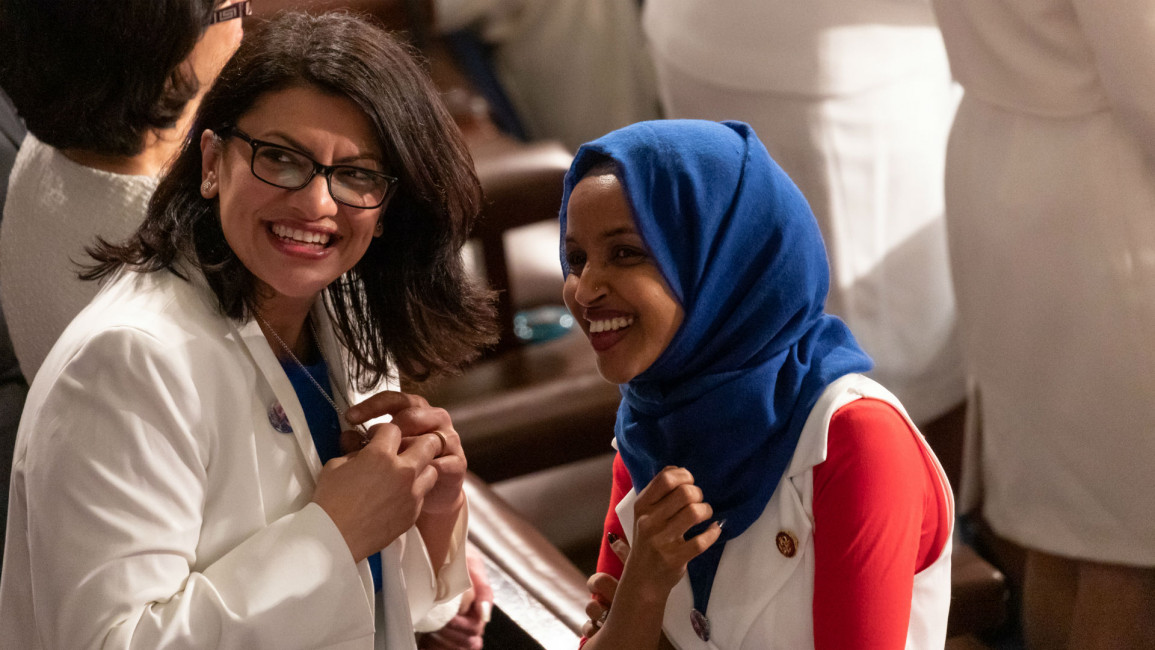
Tlaib and Omar are a threat to power. That's why they're targeted
Tlaib and Omar are a threat to power. That's why they're targeted
Comment: Their critical and unwavering politics are linked back to a history of oppression, and that injects ideological substance into the meaning of diversity, writes Malia Bouattia.
6 min read
Tlaib and Omar were celebrated; now they are castigated [Getty]
Early last month it felt like the world was celebrating the new, diverse faces of Congress, in particular, those of the first Muslims - Rashida Tlaib and Ilhan Omar - who have rocked a traditionally stale, male and pale institution.
Weeks later, their names and faces continue to flood the headlines, but this time with accusations that seem to have dangerously become synonymous with left-wing Muslim women in leadership.
Both Tlaib and Omar were - and continue to be - accused of anti-Semitism because of their uncompromising solidarity with Palestinians.
The smear campaign followed international media attention over Tlaib becoming the first Palestinian-American in the US Congress; she is the representative for Michigan's 13th congressional district, and Somali-American Omar, who is Congress' first visibly Muslim woman; she represents Minnesota's 5th congressional district.
Furthermore, a historical ruling that has existed for more than 180 years had to be overturned by House Democrats which would have previously forbidden Omar to wear her hijab.
When both women made clear their support for the Palestinian call to Boycott, Divest, and Sanction all those states, companies, and institutions that participate in, and profit from, the continued displacement, expulsion, and dispossession of the people of Palestine, they were immediately accused of harbouring anti-Semitic views and opposing Israel because of its claim to represent the Jewish people - instead of its oppression of Palestinians.
Accusations of anti-Semitism are becoming an increasingly familiar tool for character assassination, which, for example, co-organiser of the Women’s March on Washington Linda Sarsour continues to battle with. Sarsour - also of Palestinian descent - rose to prominence upon mobilising one of the most significant demonstrations and political events in recent American history following Trump's presidential inauguration.
The campaigner, who defended a radical anti-racist, anti-imperialist and anti-capitalist feminism in opposition to the white supremacy that Trump and his ilk have tried to legitimise, has since been seen as a force to be reckoned with and has come under repeated political attack.
Her name, her hijab, her words and her activism have inspired thousands around the world, particularly women of colour and Muslims. Her strength and ability to build coalitions across communities and social movements have defined her as an intersectional power-house. This has made her a threat to Republicans (and even the centre and right wing of the Democratic Party) as well as pro-Israel interests.
This Palestinian, visibly Muslim woman with a Brooklyn accent, who was gracing the cover of Glamour magazine as a woman of the year, and is recognised as a progressive force that is leading an alternative movement to Trumpism and all its bigotry, has also played an important role in placing Palestine and its continued occupation at the centre of the US political sphere.
These developments both in the streets and the state's institutions have started undermining the Israeli government's efforts to maintain its alliance with the dominant political currents in the US to suppress pro-Palestinian activity.
While the silencing campaigns by pro-Israel groups and the right in the US have succeeded in some areas - the most recent example being the success of the Middle East security bill which was voted through the US Senate on Tuesday that aims to criminalise BDS - the work and growing influence of radical, influential figures such as Sarsour, Tlaib and Omar seriously complicate these "successes".
There is an added irony to these accusations of anti-Semitism. Indeed, they highlight that while principled women of colour, committed to anti-racism, are being attacked and dragged through the mud, Israel's "allies" against BDS - such as Republicans and Trump himself - continue to whip up racism and anti-Semitism, as they have throughout their political careers.
It mattered little, for example, that one of Sarsour's earlier political campaigns was raising thousands of dollars mobilising people against the attacks on a Jewish graveyard in St Louis, or that Trump has normalised the US far-right and given a national platform to the famous anti-Semite Steve Bannon.
The issue is about breaking the back of social movements and Palestinian solidarity, whatever the costs.
In fact, the violence of the sexist, racist and xenophobic abuses and tirades that public figures, politicians, and journalists now have directed at them has been such that even those with differing political views on BDS to those of the three Muslim women - like Senator Bernie Sanders - have spoken out against their treatment.
Even pro-Israel Maryland Representative Steny D Hoyer was moved to state: "I don't know that I draw the conclusion that these two members are anti-Semitic."
These attacks are of course not only rooted in these women's identities - which, don't get me wrong, are clearly too visible for the right to bear, especially when many never thought it possible that a Muslim woman of colour dressed in her traditional Palestinian thobe would join them in the US Congress.
It is also strongly focused on the political line that they hold on Palestine and their commitment to anti-colonialism.
Weeks later, their names and faces continue to flood the headlines, but this time with accusations that seem to have dangerously become synonymous with left-wing Muslim women in leadership.
Both Tlaib and Omar were - and continue to be - accused of anti-Semitism because of their uncompromising solidarity with Palestinians.
The smear campaign followed international media attention over Tlaib becoming the first Palestinian-American in the US Congress; she is the representative for Michigan's 13th congressional district, and Somali-American Omar, who is Congress' first visibly Muslim woman; she represents Minnesota's 5th congressional district.
Furthermore, a historical ruling that has existed for more than 180 years had to be overturned by House Democrats which would have previously forbidden Omar to wear her hijab.
Twitter Post
|
When both women made clear their support for the Palestinian call to Boycott, Divest, and Sanction all those states, companies, and institutions that participate in, and profit from, the continued displacement, expulsion, and dispossession of the people of Palestine, they were immediately accused of harbouring anti-Semitic views and opposing Israel because of its claim to represent the Jewish people - instead of its oppression of Palestinians.
Accusations of anti-Semitism are becoming an increasingly familiar tool for character assassination, which, for example, co-organiser of the Women’s March on Washington Linda Sarsour continues to battle with. Sarsour - also of Palestinian descent - rose to prominence upon mobilising one of the most significant demonstrations and political events in recent American history following Trump's presidential inauguration.
The campaigner, who defended a radical anti-racist, anti-imperialist and anti-capitalist feminism in opposition to the white supremacy that Trump and his ilk have tried to legitimise, has since been seen as a force to be reckoned with and has come under repeated political attack.
Her name, her hijab, her words and her activism have inspired thousands around the world, particularly women of colour and Muslims. Her strength and ability to build coalitions across communities and social movements have defined her as an intersectional power-house. This has made her a threat to Republicans (and even the centre and right wing of the Democratic Party) as well as pro-Israel interests.
This Palestinian, visibly Muslim woman with a Brooklyn accent, who was gracing the cover of Glamour magazine as a woman of the year, and is recognised as a progressive force that is leading an alternative movement to Trumpism and all its bigotry, has also played an important role in placing Palestine and its continued occupation at the centre of the US political sphere.
These developments both in the streets and the state's institutions have started undermining the Israeli government's efforts to maintain its alliance with the dominant political currents in the US to suppress pro-Palestinian activity.
While the silencing campaigns by pro-Israel groups and the right in the US have succeeded in some areas - the most recent example being the success of the Middle East security bill which was voted through the US Senate on Tuesday that aims to criminalise BDS - the work and growing influence of radical, influential figures such as Sarsour, Tlaib and Omar seriously complicate these "successes".
 |
|
| Catch up with our special coverage of the BDS movement |
There is an added irony to these accusations of anti-Semitism. Indeed, they highlight that while principled women of colour, committed to anti-racism, are being attacked and dragged through the mud, Israel's "allies" against BDS - such as Republicans and Trump himself - continue to whip up racism and anti-Semitism, as they have throughout their political careers.
It mattered little, for example, that one of Sarsour's earlier political campaigns was raising thousands of dollars mobilising people against the attacks on a Jewish graveyard in St Louis, or that Trump has normalised the US far-right and given a national platform to the famous anti-Semite Steve Bannon.
The issue is about breaking the back of social movements and Palestinian solidarity, whatever the costs.
In fact, the violence of the sexist, racist and xenophobic abuses and tirades that public figures, politicians, and journalists now have directed at them has been such that even those with differing political views on BDS to those of the three Muslim women - like Senator Bernie Sanders - have spoken out against their treatment.
Even pro-Israel Maryland Representative Steny D Hoyer was moved to state: "I don't know that I draw the conclusion that these two members are anti-Semitic."
These attacks are of course not only rooted in these women's identities - which, don't get me wrong, are clearly too visible for the right to bear, especially when many never thought it possible that a Muslim woman of colour dressed in her traditional Palestinian thobe would join them in the US Congress.
It is also strongly focused on the political line that they hold on Palestine and their commitment to anti-colonialism.
Twitter Post
|
Diversity campaigns have become so "mainstream" that corporations, businesses and even governments are capitalising on their apparent success to further profit and agendas. But when surface level representation is challenged by the politics of equality and liberation in which fair representation is rooted, we witness the limits of this supposed diversification of western institutions - like the US Congress.
Anti-imperialism, which is inclusive of anti-capitalist demands, is much less commodifiable, therefore the need to champion a depoliticised, or at least much more liberal and controlled interpretation of diversity, becomes necessary.
Sarsour, Tlaib and Omar are a threat precisely because of their critical and unwavering politics which are linked back to the history of oppression that their people have experienced. This injects ideological substance into the meaning of diversity, lifts the lid on tokenism, and forces people to radically rethink their activism.
The Democratic Party machine was happy to celebrate them when their identities could easily be mobilised for political gain. Now that they are talking back to power, to empire, less so.
Anti-imperialism, which is inclusive of anti-capitalist demands, is much less commodifiable, therefore the need to champion a depoliticised, or at least much more liberal and controlled interpretation of diversity, becomes necessary.
Sarsour, Tlaib and Omar are a threat precisely because of their critical and unwavering politics which are linked back to the history of oppression that their people have experienced. This injects ideological substance into the meaning of diversity, lifts the lid on tokenism, and forces people to radically rethink their activism.
The Democratic Party machine was happy to celebrate them when their identities could easily be mobilised for political gain. Now that they are talking back to power, to empire, less so.
In the words of Bell Hooks:
"Representation is the 'hot' issue right now because it's a major realm of power for any system of domination. We keep coming back to the question of representation because identity is always about representation. People forget that when they wanted white women to get into the workforce because of the world war, what did they start doing? They started having a lot of commercials, a lot of movies, a lot of things that were redoing the female image, saying, 'Hey you can work for the war, but you can still be feminine.'
Similarly, right now, as people of colour are increasingly entering positions of power and institutions from which they were previously excluded, they are being told very clearly where the limits of their integration lie, and what boundaries not to cross.
This should remind us, always, that the master's tools will never dismantle the master's house.
This should remind us, always, that the master's tools will never dismantle the master's house.
Malia Bouattia is an activist, a former president of the National Union of Students, and co-founder of the Students not Suspects/Educators not Informants Network.
Follow her on Twitter: @MaliaBouattia
Opinions expressed in this article remain those of the author and do not necessarily represent those of The New Arab, its editorial board or staff.
Follow her on Twitter: @MaliaBouattia
Opinions expressed in this article remain those of the author and do not necessarily represent those of The New Arab, its editorial board or staff.



